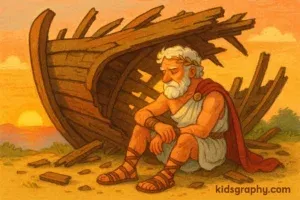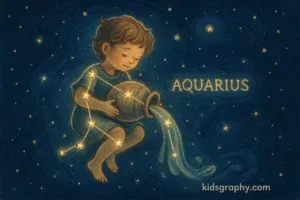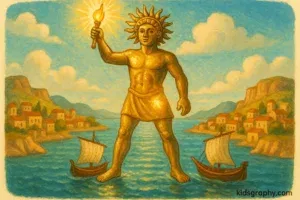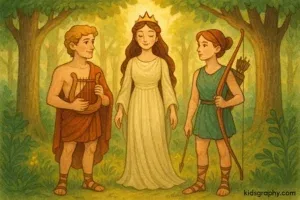Triton is a powerful and mysterious figure in Greek mythology. He is known as the messenger of the sea and is often pictured as a mighty merman—half-man, half-fish. Triton’s presence in myths is tied closely to the ocean and to his father, the mighty sea god Poseidon.
Read More: Ariadne in Greek Mythology: Heroine of the Labyrinth
Who Is Triton in Greek Mythology?
Triton is the son of Poseidon, god of the sea, and Amphitrite, a sea goddess. He lives in a grand golden palace beneath the ocean and is a loyal servant to his father.
He is often described as:
- A giant merman with the upper body of a man and the tail of a fish
- A powerful sea god with magical abilities
- A herald, or messenger, who uses his shell to calm or stir the waves
In myths, Triton is not just a sea creature—he is a deity with his own unique role in keeping the waters in balance.
Read More: Argus in Greek Mythology: The Giant with 100 Eyes
Triton’s Powers in Greek Mythology
Triton’s most famous power is his conch shell trumpet. When he blows it, he can:
- Calm rough seas or stir up wild storms
- Send messages across the ocean
- Scare away enemies with a sound so loud it causes fear and confusion
In many stories, sailors feared or respected Triton because he could control the mood of the ocean. He didn’t fight often, but his presence brought both peace and warning.
Read More: Greek Mythology Monsters: Creatures of Legend & Fear
Triton’s Role as a Sea God
While not as famous as Poseidon, Triton was considered a minor sea god. His job was to:
- Assist Poseidon in his underwater kingdom
- Guide lost ships
- Deliver messages from the gods across the oceans
Triton was one of the original sea gods, and in later myths, the word “tritons” was used to describe many sea spirits like him. He became a symbol of communication and control over the sea.
Read More: Talos in Greek Mythology: The Bronze Giant of Crete
Triton in Art and Culture
Triton appears in many ancient artworks, often shown:
- Riding a sea horse-drawn chariot
- Blowing a shell trumpet
- Surrounded by sea creatures like dolphins and fish
In modern times, you may recognize him from stories like The Little Mermaid, where King Triton is based on this very myth. He also appears in books, fantasy films, and even science fiction.
Read More: Kratos in Greek Mythology: The God of Strength
Triton’s Legacy Today
Triton’s name lives on in various ways:
- “Triton” is the name of Neptune’s largest moon, honoring his role as a sea god
- Statues of Triton can be found in fountains across Europe, symbolizing water and peace
- His image inspires modern depictions of mermen and ocean gods
Though he’s not as well-known as Poseidon, Triton remains a strong figure in both ancient and modern storytelling.
Read More: Nike in Greek Mythology: Goddess of Victory
Triton’s Family and Origins
Triton was born to Poseidon, the powerful god of the seas, and Amphitrite, a graceful sea goddess and one of the fifty Nereids. Together, they ruled the ocean depths. Triton grew up in an underwater palace made of coral and precious stones, located deep in the sea.
In some myths, Triton had siblings or companions, depending on the version of the tale. Though often seen as a single figure, later writers began using the term “Tritons” to describe a race of mermen-like sea spirits modeled after him.
This shift turned Triton from a unique god into the face of an entire species of sea messengers in later classical art and literature.
Triton’s Role in Heroic Myths
Although Triton is not a major figure in most Greek epics, he appears in several key myths—especially as a helper of heroes. One notable appearance is in the Argonautica, the epic tale of Jason and the Argonauts.
When the heroes were lost near Lake Tritonis in Libya, they prayed for guidance. Triton appeared, disguised as a local man. He showed them the way and helped them carry their ship back to the sea. Before leaving, he revealed his divine identity and vanished into the water.
This moment shows that Triton wasn’t just a sea god—he was also a protector and guide, especially for those who respected the ocean.
Read More: Cassandra in Greek Mythology: The Cursed Prophetess
Triton vs. Other Sea Gods
While Triton is the son of Poseidon, he is not the same as Poseidon, nor is he as powerful. Here’s how he compares to other sea deities:
- Poseidon: The god of the entire sea, storms, and earthquakes. He rules Olympus’s oceanic domain.
- Nereus: An older sea god known for his wisdom and shapeshifting abilities.
- Proteus: A prophetic sea god who could change shape and tell the future.
- Triton: A loyal servant and messenger of Poseidon with the power to control sea waves using his magical conch shell.
Triton represents youthful energy, obedience, and ocean harmony, while others like Nereus and Proteus are symbols of mystery and ancient wisdom.
More Stories: Triton in Greek Mythology
FAQ: Triton in Greek Mythology
Triton is the son of Poseidon and Amphitrite, known as the sea god’s messenger. Artists often depict him as a merman holding a conch shell trumpet.
Triton can calm or stir the sea using his magical conch shell. His trumpet sound could terrify enemies and signal messages across the oceans.
Triton is considered a minor god of the sea. While not as powerful as Poseidon, he plays an important role in ocean myths and divine communication.
Yes, in the myth of the Argonauts, Triton guides Jason and his crew back to the sea when they get lost inland.
Triton symbolizes the voice of the ocean, strength, guidance, and harmony with the sea. Artists and storytellers often portray him as a guardian of water in both art and culture.
Read More: Iris in Greek Mythology: Goddess of Rainbows and Messages







